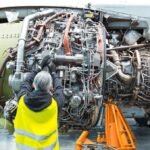Choosing Your Aviation Path:
In the vast and ever-evolving field of aviation, individuals looking to soar in their careers face a fundamental decision: pursue an aviation degree or become an aviation technician. This choice is crucial, as it shapes your future in aerospace and aviation sectors, influencing job prospects, earning potential, and career trajectory. In this comprehensive guide, we will explore both aviation path in depth to help you make an informed decision based on your interests, skills, and career goals.

Understanding the Aviation Path
An aviation degree typically involves a four-year Bachelor’s program that covers a wide range of subjects including flight operations, aviation safety, aviation law, aircraft systems, and global aviation management. These programs are designed to provide students with a broad understanding of the aviation industry, along with critical thinking and leadership skills.
- Benefits of Earning an Aviation Degree
- Career Versatility: Graduates can pursue various roles, not just in piloting and engineering but also in management, air traffic control, and aviation planning.
- Higher Earning Potential: A degree often opens up higher salary brackets and positions within companies that prioritize or require collegiate education.
- Global Opportunities: Degrees are recognized globally, allowing for international career opportunities.
- Potential Careers with an Aviation Degree
- Airline Pilot
- Aviation Manager
- Aerospace Engineer
- Air Traffic Controller
Exploring the Aviation Technician Path
On the other hand, becoming an aviation technician involves training focused primarily on the maintenance and repair of aircraft. This is usually achieved through vocational schools or technical courses, which typically last from 18 months to two years.
- Benefits of Becoming an Aviation Technician
- Hands-On Experience: Immediate hands-on work with aircraft, providing practical experience and expertise in specific systems like engines, electrical systems, and avionics.
- Faster Entry into the Workforce: Technical programs are shorter than degree programs, allowing quicker entry into the field.
- Certifications and Licenses: Technicians can earn FAA certifications, which are essential for career advancement.
- Potential Careers for Aviation Technicians
- Aircraft Mechanic
- Avionics Technician
- Aircraft Inspector
- Line Technician
Deciding Factors in Choosing Your Aviation Path
When choosing between an aviation degree and becoming a technician, consider the following key factors:
- Personal Interests and Skills: Do you enjoy hands-on work or prefer broader managerial roles?
- Educational Commitment: Are you ready for a four-year degree or do you wish to start working sooner?
- Career Goals: Where do you see yourself in ten years? Managing an airport or working directly with aircraft?
- Financial Considerations: Weigh the initial cost of education against potential earnings. Typically, technicians enter the workforce sooner, which allows for earlier income.
Financial Implications of Each Path
- Cost of Education: Aviation degrees generally require a larger financial investment compared to technical training programs.
- Return on Investment: Although technicians can start earning sooner, degree holders may have higher lifetime earnings due to management positions that offer higher salaries.
Long-term Career Outlook
- Growth in Aviation: Both paths offer substantial growth with the global expansion of the aviation industry.
- Technological Advancements: Staying updated with the latest technology is crucial, more so for technicians who handle daily operations and maintenance

Choosing between pursuing a degree in aviation or becoming an aviation technician depends on your career goals, interests, and strengths. Here are some factors to consider for each path:
Degree in Aviation:
- Career Opportunities: A degree in aviation can open doors to various career paths such as pilot, air traffic controller, aviation management, aviation safety inspector, aerospace engineer, and more.
- Depth of Knowledge: A degree program typically offers a comprehensive understanding of aviation theory, regulations, safety protocols, and industry trends. You’ll gain a broad perspective on the aviation industry.
- Professional Advancement: A bachelor’s or master’s degree in aviation can enhance your qualifications and increase your chances of advancing to higher positions within the industry.
- Networking Opportunities: University programs often provide opportunities to network with industry professionals, participate in internships, and engage in research projects, which can be valuable for career development.
Aviation Technician:
- Hands-On Skills: Aviation technicians specialize in maintaining, repairing, and troubleshooting aircraft systems and components. If you enjoy working with your hands and solving technical problems, this could be a rewarding career path.
- Certification: Depending on your specialization (e.g., airframe, powerplant, avionics), you’ll need to obtain the appropriate certifications from organizations like the Federal Aviation Administration (FAA) or European Aviation Safety Agency (EASA).
- Job Stability: Skilled aviation technicians are in demand globally, and the job market tends to be stable. Airlines, maintenance facilities, and aerospace manufacturers all require skilled technicians to keep their aircraft in safe operating condition.
- Training Options: You can pursue aviation technician training through vocational schools, community colleges, or specialized aviation maintenance programs. These programs typically focus on hands-on training and may be shorter in duration compared to a degree program.
Considerations:
- Career Goals: Determine what specific role you envision in the aviation industry and choose the aviation path that aligns with your career goals.
- Preferences: Consider whether you prefer a more theoretical and academic approach (degree) or a practical, hands-on approach (technician).
- Long-Term Plans: Think about your long-term career aspirations and whether additional education or certifications may be necessary to achieve them.
Ultimately, both paths offer rewarding opportunities in the aviation industry. It’s essential to research each option thoroughly, consider your strengths and interests, and make an informed decision based on your individual circumstances and goals.
Frequently Asked Questions (FAQ)
1. What is the main difference between studying for an aviation degree and becoming an aviation technician?
- Studying for an aviation degree typically involves a broader, more theoretical education covering various aspects of the aviation industry, including flying, management, and safety. Becoming an aviation technician focuses more on the practical skills needed to maintain and repair aircraft.
2. How long does it take to complete an aviation degree compared to technician certification?
- An aviation degree usually takes about four years to complete if you are pursuing a bachelor’s degree. Technician certification programs can vary, ranging from 18 months to two years, depending on the specific program and whether you are full-time or part-time.
3. Are there different types of aviation degrees and technician certifications?
- Yes, aviation degrees can range from pilot training to aviation management, safety, and engineering. Technician certifications can include Airframe and Powerplant (A&P) certification, avionics, and other specialized areas.
4. What are the employment prospects like in each field?
- Both fields generally have strong employment prospects. Pilots, air traffic controllers, and aviation managers are always in demand, and the growing complexity of aircraft technology continues to require skilled technicians. Specific demand can vary by region and current economic conditions.
5. Can I switch careers between being an aviation technician and a role that typically requires an aviation degree?
- Yes, many skills are transferable, and further education or training can facilitate a career switch. For instance, a technician with experience might choose to pursue an aviation management degree to move into a supervisory or administrative role.
6. What are the salary expectations for each path?
- Salaries can vary widely depending on the specific job, location, and level of experience. Generally, roles requiring a degree might offer higher starting salaries, but skilled technicians can also earn competitive wages, especially with experience and specialized certifications.
7. What kind of work environment can I expect in each path?
- Aviation degree holders might find themselves in a variety of settings including offices, airports, and control towers, depending on their specific job. Technicians typically work in hangars, repair stations, or on airfields and may often be required to work nights and weekends, depending on flight schedules.
8. Is there financial aid available for both educational paths?
- Financial aid, including scholarships, grants, and loans, is generally available for both paths through various sources such as federal programs, aviation organizations, and sometimes employers themselves.
9. What skills are important for each career path?
- Both paths require a strong attention to detail and safety awareness. Degree aviation path often require strong analytical and decision-making skills, while technician roles emphasize problem-solving, manual dexterity, and practical technical skills.
10. How can I decide which aviation path is right for me? – Consider your interests, strengths, and career goals. If you prefer hands-on work and have a strong interest in mechanics and electronics, becoming a technician might be more suitable. If you’re interested in a broader understanding of the aviation industry, management, or becoming a pilot, a degree might be the better option. Informational interviews and job shadowing can also help provide insight into each role.
11. What prerequisites are required for each aviation path?
- For an aviation degree, prerequisites typically include a high school diploma or equivalent, and some programs might require specific courses in mathematics, physics, or related subjects. For technician programs, the requirements are similar, though some might also include technical aptitude tests.
12. How important is certification in each field?
- Certification is crucial, especially for technicians. For instance, FAA certification is necessary for those working on aircraft to ensure they meet all safety and regulatory requirements. While not all aviation degree roles require certification, pilots and air traffic controllers need specific licenses and certifications.
13. What are the typical entry-level positions for each path?
- For aviation degree graduates, entry-level positions might include roles such as junior air traffic controller, flight coordinator, or aviation analyst. For technicians, entry-level jobs are often as aircraft mechanics or maintenance assistants, where they can gain the experience needed for further certification and advancement.
14. How does ongoing education play a role in each career path?
- In both fields, continuing education is important due to the evolving nature of technology and regulatory requirements in aviation. Degree holders might pursue additional certifications or advanced degrees for career advancement, while technicians often need to complete recurrent training to maintain their certifications and stay current with new technologies.
15. What impact do industry changes have on each career aviation path?
- The aviation industry is sensitive to technological advances, economic shifts, and changes in global travel patterns. Degree holders might need to adapt to changes in management practices, safety protocols, or regulatory environments. Technicians will need to keep up with advancements in aircraft technology, including new materials, systems, and digital diagnostics tools.
16. Are there international opportunities in each field?
- Yes, aviation is a global industry, and both paths can lead to opportunities worldwide. Degree holders might work with international airlines, global aerospace companies, or at international airports. Technicians might also find jobs abroad, especially in places with growing aviation sectors.
17. What kind of people excel in each path?
- People who excel in degree-oriented aviation careers often have strong analytical skills, are detail-oriented, and can manage multiple tasks effectively. Those who succeed as aviation technicians are usually good problem solvers, enjoy practical work, and are meticulous about adhering to safety standards and protocols.
18. How does the work-life balance compare between the two aviation paths?
- Work-life balance can vary significantly. Many aviation degree-related roles, such as managerial positions, might offer a standard office hour schedule, though travel can be a component. Technician roles can involve shift work, including nights and weekends, due to the 24/7 operational needs of airports and maintenance facilities


